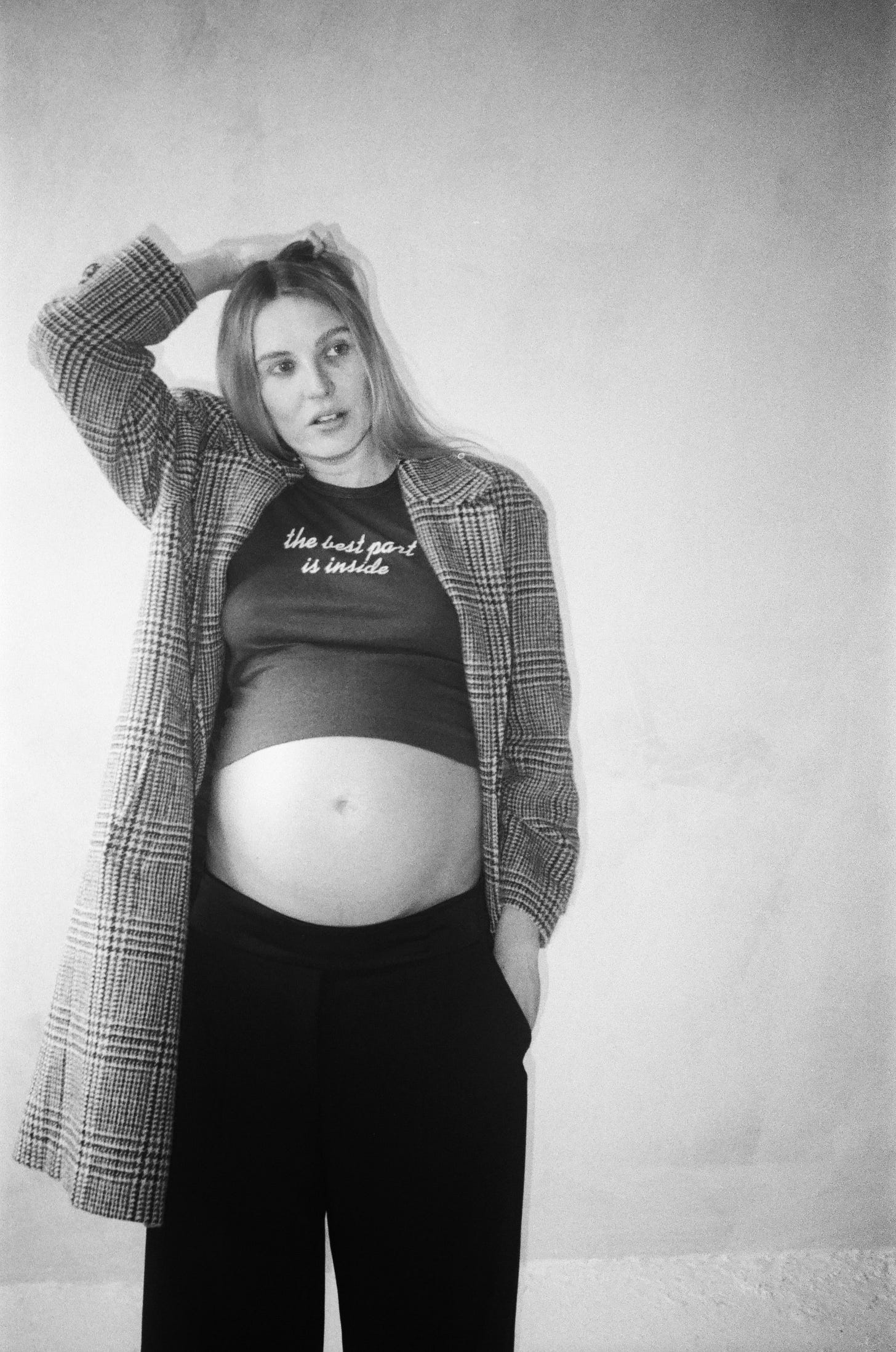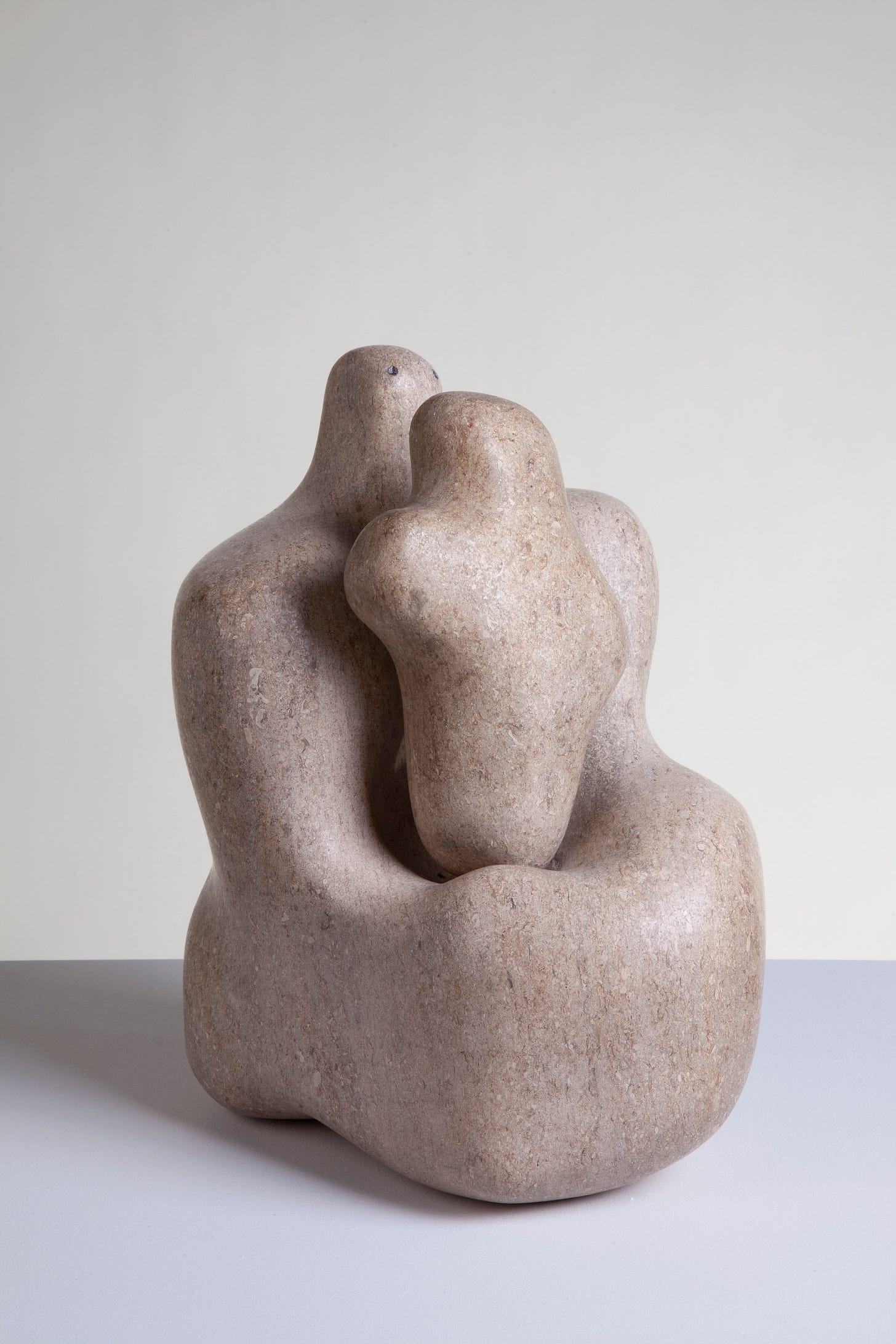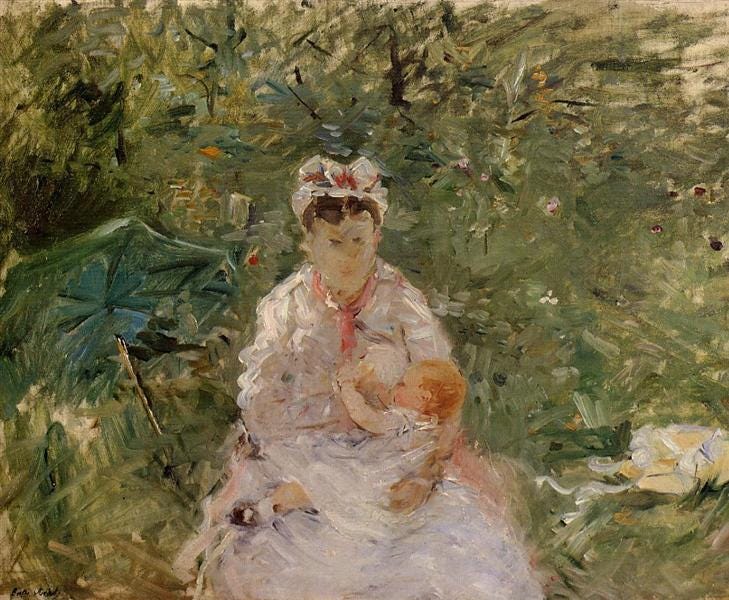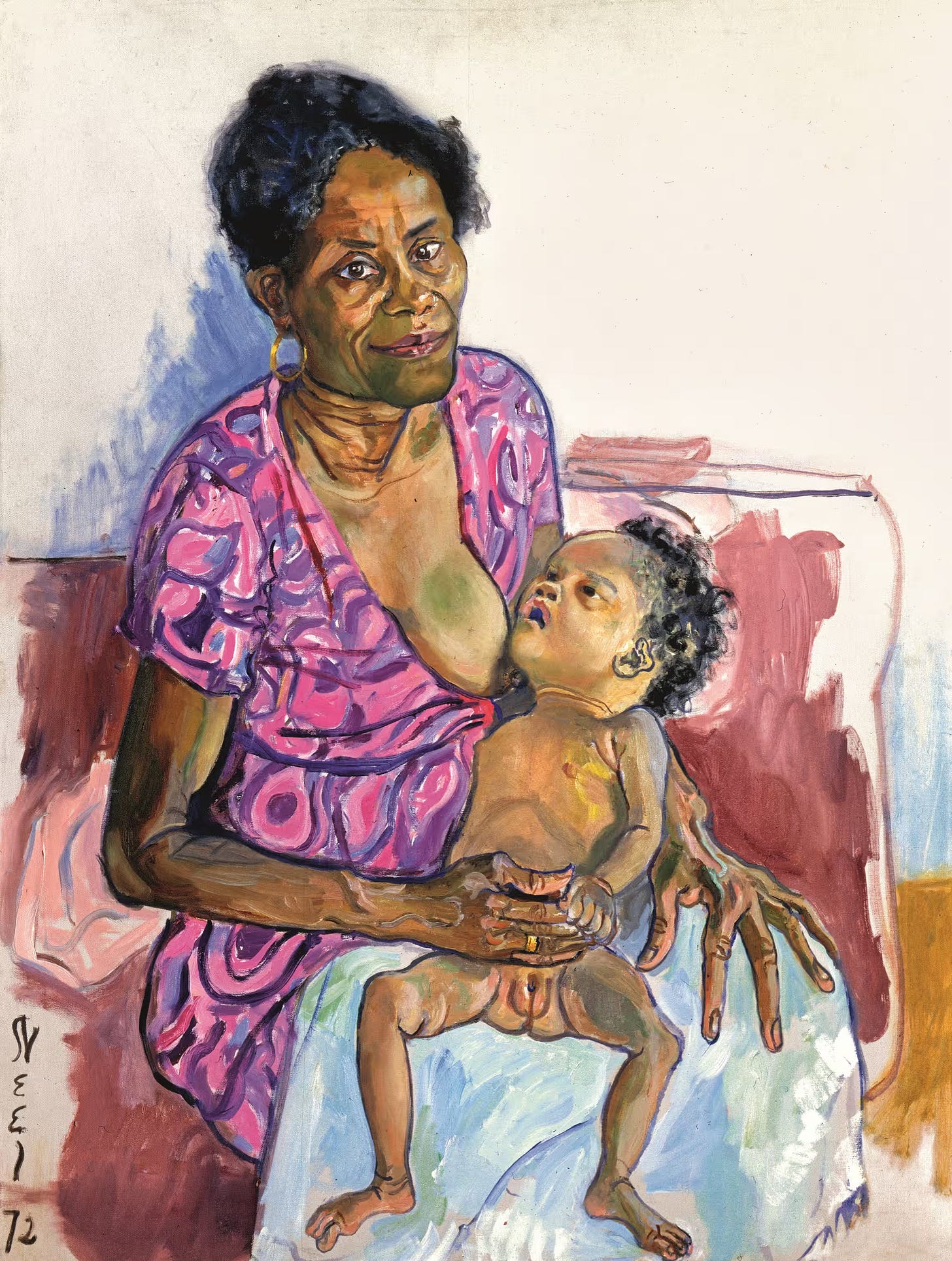Portrait by Gabby Laurent
When I was ten years old, my father took my brother and me to a small seaside town during our winter holiday break. We stayed in a nice hotel, with large glass elevators and a sprawling atrium with an indoor pool, which meant you could swim in warm, tropical heat even while heavy rain thrummed on the far-off roof. Beside the pool was a breakfast buffet, and one morning I ate so many slices of jam-buttered toast that when I stood up to leave I found that my stomach had burst out in front of me, bloated and round. My first instinct was to nurse it, cupping my hands over the sides of my swollen belly to cradle an imagined child. As we walked past the splashing crowds, my hand maturely resting on my protruding stomach, I liked the idea that people saw me and thought, scandalised, that girl is far too young to have a baby.
This is the first memory I have in which I am aware of the fact that I might one day become a mother. In that moment motherhood felt subversive and scandalous, exciting. By the time I gave birth to my son two decades later—on a quiet afternoon in the final days of a mild London winter—my view of motherhood had changed. Bolstered by whichever wave of feminism we now find ourselves in, with its quest for radical honesty, and by late-stage capitalism and its unrelenting demands for optimised labour, I had come to think of having a child primarily as a kind of death, the surrendering of myself, my dreams and ambitions, my beauty and youth, the crackling glee of a selfless mind and a vista of infinite time. To what, exactly, I still wasn’t sure—to the inevitability of human procreation? To the fear that if I didn’t become a mother I might regret it? To the deeper fear that not having children was to stay suspended in a state of perpetual girlhood? To truer, simpler fact that I wanted to have a child, and thought I would be good at it?
I had the great fortune of falling pregnant quickly, so I didn’t have time to properly metabolise any of these questions before motherhood became my reality. I travelled and worked constantly through the debilitating morning sickness and fatigue of early pregnancy—flying from London to Sydney, New York to Paris. I read no books on parenthood, visited no online motherhood forums, listened to no podcasts. A couple of weeks before my due date, I woke in the night with Braxton Hicks contractions, and realised that if I were to go into labour early, I had nothing in my home to care for a child: no crib, no dummies. It wasn’t that I didn’t think about my son, I thought about him constantly. About his growing femurs and fingernails, the colour of his eyes, about whether he would like to paint or play guitar. But I didn’t think much about the pragmatic realities of raising a child. I knew nothing about breastfeeding or sleep training or the cognitive development of newborns. My concerns were self-directed and existential—would I ever be able to write something of value now that my time was about to disappear? I had recently turned 30 and felt for the first time in my life like I knew myself, which had given me the confidence to begin writing fiction as a serious artistic pursuit. My creative life still felt nascent and fragile—would a child shatter it entirely?
Before giving birth, I imagined motherhood as soft and sedate—nice women cooing, soft plush toys, baby pinks and blues. The reality was chaos: punk, angry, violent, bloodied. The week before I gave birth I had an antenatal physio appointment. While the practitioner placed her fingers inside my vagina, she told me, cheerfully, that “following a C-section it is not uncommon to have a prolapsed bladder.” In my first few days postpartum, blood was as common a sight as the soft whiteness of milk. The first picture of my son is gloriously bloody—him crying and blue, still tethered to my blood-smeared body. The morning after his birth, fourteen hours after doctors had sliced through six layers of skin and fat and fascia, including my uterine wall, the midwives had me stand up and hobble to the bathroom to urinate into a paper bucket. I looked down and was horrified to find it overflowing with blood. Breastfeeding was so difficult my nipples bled. I had to change a bloodied maxi pad every couple of hours. On my phone I found a note: “If you find a blood clot larger than a 50p coin, call the midwife”.
‘Mother and Child’ by Barbara Hepworth (1934)
Those early days had the hallucinatory quality of a drug trip. When I came home from the hospital, having slowly climbed the three flights of stairs to my apartment, with my slashed belly vibrating with pain, I felt the same discomfiting weirdness that I used to feel when I crawled into bed after a night of heavy partying. I didn’t just dream of my son. In my fugue state, sometimes I felt I was him, that we were two simultaneous and coexisting beings, that I too was 3.3 kilograms, rolled into a fetal position and sleeping in an automated, swaying cot. I felt like I had been thrust violently into the world for the first time, and I was frightened by its vast unknowability. I wanted to be fed and cradled and shushed and stroked. When, a few days after he was born, a patch of dry skin above my son’s foot cracked and bled, I woke that night with phantom pain in the same place. When I held him and heard the rumbling of a belly, I couldn’t tell if the noise emanated from his body or mine. He felt more like me than I did.
My life was stripped back to the same basic functionality as a newborn: eat, sleep, digest, cry. I struggled to walk and spoke only to make demands. I felt too sick to eat, so food became little more than concentrated nutrition. I thought about what I ate in terms of iron and fibre and protein, things my son needed, for which I was little more than a conduit. Sleep too became purely functional. I could sleep only for short, snatched hours. Even though all I wanted to do was sit beside his crib and stare at his face, I would drag myself into bed because I knew sleep would charge me, like a machine plugged into a wall. I became awed by the brilliantly attuned machinery of the human body. My breasts would fill with milk and a few moments later my hungry son would wake and begin to cry. I learned that when babies latch, their saliva is interpreted by the mother’s body, which adjusts the composition of milk to respond to the child’s nutrient deficiencies, creating more antibodies and immune cells if the baby is sick. I suddenly saw myself from the vantage point of human history, time stretching out infinitely in front of me and behind me. I was a link in the long, unbroken chain of human existence. I felt foolish for ever having conceived of myself as a single unique individual.
When I eventually left the house, I found I imagined every person I encountered as a newborn baby. I saw what their faces must have looked like, how they would have stretched out and scrunched up their knees and made demands of their mothers. One morning I took my son for a walk around Hampstead Heath, where I sat on a bench and watched people scattered across a sloping grassy knoll. There were loved-up teenagers and middle-aged men and a gaggle of octogenarian women, but they all looked like children to me, stretching and moving and laughing and crying and digesting and eating, looking for comfort, confused by their own impulses, guided and dictated by primal desires often beyond their understanding.
It was a few weeks before I had the mental capacity to speak to friends on the phone. “Are you the same?” one asked tentatively. I wasn’t sure how to answer her. I felt like I had changed entirely, each cell replaced, like the ship of Theseus. But I wasn’t changed in the way I thought I would be. I still had the same interests and desires and ambitions, the same hopes and fears, though they seemed to throb less urgently now, buried below new, louder layers. In many ways this is what the process of becoming a mother—matrescence, as Lucy Jones describes in her wonderful book—is, making room for two selves to coexist in the same body. ‘Surrender’ is a word I have thought about a lot in these last few weeks, learning to surrender to an existence of duality and contradiction. I am writing this at the local library, while my sister-in-law looks after my son, and I feel both dizzyingly liberated and almost physically pained by his absence. Some days I love my body, am mesmerised by its capabilities, and other days it feels unrecognisable to me, womanly and shapely, with the sudden undulations of breasts and hips. When I look at my son, I am seized by an annihilating degree of love and contentment. I feel that I have never been happier or more fulfilled. But some days—when I am so tired I reread the same line of a book a dozen times before giving up, or find that I have spent ten minutes passionately talking to my husband about the benefits of organic goat’s milk—I am seized by the horrifying notion that the mind I have spent three decades lovingly nourishing is suddenly slipping through my fingers. My time no longer belongs to me—and what is life if not a fleeting succession of time?
‘The Wet Nurse Angele Feeding Julie Manet’ by Berthe Morisot (1880)
Before becoming a mother, my view of motherhood was schizophrenic, a refraction of opposing, contradictory images—mummy bloggers with their messy hair, crying in milk-stained shirts; Sofia Coppola with her young daughter on the set of Somewhere; the ornate dyad of Madonna and child; pregnant Kim Kardashian in floral Givenchy at the Met Gala; my saintly Irish grandmother who, according to family lore, plated ten different dinners each night to cater to her ten children’s different food preferences. These images reflect a confused culture, one in which motherhood is at once sanctified and belittled. This contradiction becomes manifest when you are navigating new motherhood. You are expected to exclusively breastfeed, but discover there are no public spaces designed for breastfeeding. You are expected to stay at home to care for the child but still financially contribute to a dual-income household. You’re expected to “bounce back” while also increasing the amount of food you consume (to increase your breast milk supply) and not exercising (time away from the baby). You’re expected to make motherhood your life but not your personality, to be entirely transformed while staying entirely the same. Before giving birth, I found it refreshing—“cool” in the most literal sense— when women kept their children hidden from their digital presence. Now, I find it oddly Victorian, a tacit continuation of the patriarchal trend of hiding motherhood from public view.
I was utterly unprepared for the reality of new motherhood, and as the weeks stretched out, I came to see this as a conspiracy of silence. Why had I never seen these early weeks depicted honestly? Where are the great novels about mothering? The great songs? The great films? The conceiving, birthing and raising of children is the lifeforce of all humanity, and yet if one were to look at the history of literature, fine art, music, and cinema, you would find little to suggest that motherhood exists at all. For my first Mother’s Day, my husband bought me Hettie Judah’s ‘Acts of Creation’, a treatise on the role of motherhood in art. I inhaled it in snatched fragments, often in the serene quiet of a 3AM feed. Before that, I didn’t know that Barbara Hepworth crafted some of her greatest sculptures while pregnant with triplets, or that Louise Bourgeois’ spider installations were inspired by her mother, that Frida Kahlo’s most sensitive portraits depict her in the midst of a debilitating miscarriage, or that Alice Neel painted her greatest artworks in the early hours of the morning while her young sons slept. Judah tracks the erasure of the mother-artist from art history, citing, as an example, the archives of London’s National Portrait Gallery. Aside from a Mary Beale portrait of the artist and her sons from 1666, there was not a single artwork featuring a mother and child in the gallery’s archives until Chantal Joffe’s remarkable ‘Self Portrait with Esme’ in 2008. As Judah puts it, “In this venerable and extensive portrait collection, Beale and Joffe were separated by 342 years of British painting during which the artist as mother was not visible.”
Judah’s book not only examined the visual representation of mothers in art, but the challenges placed on the mother as an artist. One of my greatest fears about motherhood was that I wouldn’t be able to create meaningful work. It seemed to me that the great women writers I admired were all childless—Virginia Woolf and George Eliot and Emily Brontë. In Sheila Heti’s ‘Motherhood’ the narrator, unsure if she wants to have children, has a conversation with her partner, who is ambivalent about having children. “He said that one can either be a great artist and a mediocre parent, or the reverse, but not great at both, because both art and parenthood take all of one’s time and attention.” When I interviewed Zadie Smith for Harper’s Bazaar a couple of years ago, I asked her about this. As one of our era’s great artists and a mother of two, she unsurprisingly disagreed that artistry and parenthood were mutually exclusive. “It’s like apples and oranges,” she shrugged. “When I think of Virginia Woolf or George Eliot, I think of people who wrote like daughters their whole lives. And in no way is that an insult, someone needs to write from the perspective of the daughter. The daughter never compromises, the daughter never feels sorry for her parents, she fucking hates them until the day she dies. The daughter is in a radical position. I’m not a daughter anymore, I’m a mother, so I do feel sorry for my parents … [and] I will always be a different type of writer. I won’t write in the way that [they] wrote, because life has thrown me something else. But I think both of those ways of seeing need to exist.”
Smith found, as I have already found, that motherhood has the unexpected benefit of helping one better conceptualise time. “In my experience when I had all day to write a novel, I didn’t write a novel, and now that I have less time, I do,” she said. “My colleague Mr Franzen, over there in California, doesn’t have children. He writes a book, and it takes ten years. A lot of writers take ten years. And if they had kids it would probably take two years.” Ultimately, Smith takes issue with our culture’s inability to appropriately value the work of motherhood. “If I were talking to a young self I would say, ‘Why have you swallowed this entirely capitalist idea that freedom comes in being a unique, single person who buys things? Why do you believe that, and why do you experience every human connection as oppression?’ That’s something that has been sold to you, that belief that anything that is to do with a traditionally feminine world is just oppressive and uninteresting. Who says so? For me, raising my children is the most complicated, intellectual, and creative thing I do, by far. Novels are, whatever. I can do that in my sleep. Trying to raise my children so they don’t fucking hate me, that is so hard. I can’t tell you how hard that is, and how many skills it involves to do that well. If you had a good mother, you should be building monuments to them.”
‘Carmen and Judy’ by Alice Neel (1972)
When I was a magazine editor I was often gifted designer handbags, including a brown leather monogrammed tote from Celine. This bag used to house all kinds of detritus and debris, scenes from a life: receipts, lipstick-kissed tissues, shiny gold chocolate hearts, three interchangeable blushes, four interchangeable lipsticks, bulky headphones, a couple of paperbacks, two pairs of sunglasses, a water bottle, old movie stubs and tickets from the Paris Metro. I liked the idea of a handbag being a kind of living, breathing organism, like Jane Birkin’s in that Agnes Varda film, the juvenile notion—so often exploited by fashion magazines—that the contents of one’s handbag say something essential about a person. Now the same bag is filled with a neat and orderly inventory of items, each serving a wholly logistical purpose: six nappies, compostable nappy sacks, wet wipes, alcohol-free hand sanitiser, a sterilized container with a sterilised dummy, a sterilised container with emergency formula, a thermos with 70 degree water, a sterilised glass bottle, two muslin cloths, a spare pair of baby socks, two spare pairs of babygrows, a knitted cap, a linen throw for breastfeeding in public. There is one side panel for my things, in which I place a thin book, eyebrow gel, tinted lip balm, a pair of sunglasses, my AirPods, and my keys. I keep coming back to this image because it feels as close as I can come to explaining what has happened to my sense of self since becoming a mother. The contents of my mind have been taken over by the all-consuming bulk that is child-rearing. The time I have to think about and consider myself has reduced to a small sliver. And yet, I never leave the house feeling like I don’t have an item I wish I had, the lessening of space doesn’t feel like a tightening or constriction. It doesn’t feel like a sacrifice.
I think parents will find this idea beautiful, and non-parents will find it horrifying. Both reactions are valid. Motherhood is the stripping of one’s self back to the bare essentials, a distillation of oneself into something smaller. Yet in my experience, it’s more potent. Life before Eli seems endless, chaotic, a rambling, big, beautiful mess of a thing that couldn’t be understood or contained. Now life seems like a single line, a succession of units of time, finite and conceivable and terrifyingly fleeting. I now feel a responsibility not to allow time to happen to me, but instead suck as much life as I can out of every meagre hour. I think nowadays many mothers don’t speak honestly about how much they love having children, fearful that they’ll sound evangelical, or insensitive towards women who struggle with infertility, or that they’ll be letting down some great feminist project if they admit that, actually, they find in their children that great, promised wholeness. Not only do I love my son with a fierceness that far exceeds the bounds of language, I love that his mere existence reminds me of my own mortality. I love that caring for him is the most challenging thing I have ever done. I don’t believe you need to have a child to become a better person, or that parenthood improves every person. But he has made me better, he just has. And he has restored the fascination with motherhood that I felt, innately, as a girl. Being a mother is subversive and scandalous. It’s also utterly banal, as ordinary as breathing, and magnificent and frightening and worthy of great investigation, great art. Worth writing about enough that I am willing to leave him to do it, which is perhaps the greatest contradiction of all.









I just read this after seeing the paywall was removed temporarily. I cannot tell you how timely this has been for me; I had a c section with my first child 11 days ago and I am currently right in the thick of the early days that you write about so beautifully. I am currently sat in bed with my 11-day old son next to me, after patching together 6 hours of sleep (I’ve been in bed for 12) between the relentless night feeds which has caused me to have a constant pain behind the back of my eyes. I too am also experiencing the bizarre and disorienting trippy feeling where I felt like, I myself, am my baby. A few times I have woken myself up by shooting my arms up in the air like I’m a newborn with the moro reflex. When I look in my mirror I literally see myself as a baby and when I’m changing his nappy my hands look like baby hands. When I watch TV, the people on TV look like babies. Their bodies are all out of proportion with tiny bodies/hands and massive heads. I thought I was going bonkers (which could definitely still be true) but your piece is the first time I’ve read anything where my hallucinatory experience has been reflected. I also desperately tried to search for a Reddit thread about this to validate my experience, but to no avail! This piece will stay with me forever <3
I fear that I am now pregnant with growing tears